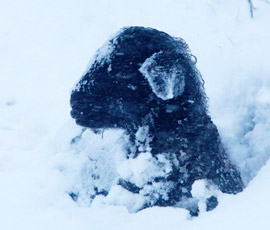Carcasses pile up on snow-hit farms

Snow-hit farmers are being urged to arrange bulk collections of dead stock – or to deliver carcasses directly to collectors using tractors and trailers.
Carcasses are piling up on farms as more dead animals are recovered following snow storms during the coldest March for 51 years.
More than 25,000 sheep, lambs and cattle are believed to have died, with the death toll due to rise as warmer melts snow to reveal more dead stock.
“As the snow begins to recede, farmers are uncovering more dead sheep in the snow and numbers are starting to mount in farm yards,” said NFU livestock chairman Charles Sercombe.
He added: “We are receiving reports of farms with hundreds of breeding sheep that have been lost in drifts.”
The government has given farmers permission to bury dead stock on farms. But this is not an option for many farmers, especially in upland areas with thin soils on rock.
DEFRA has also given permission for farmers to burn carcasses, but many are reluctant to build funeral pyres for fear of bringing back painful memories of the 2001 foot-and-mouth crisis.
The NFU has called for the National Fallen Stock Company (NFSC), which helps coordinate carcass disposal, to arrange for free collections from farms.
But the not-for-profit company says such a move would effectively put it out of business.
Instead, it is advising farmers to arrange for bulk collections from farm on a weight basis.
Alternatively, farmers are also being urged to consider delivering fallen stock directly into a collector via a tractor and trailer.
Many collectors would be happy to receive carcasses this way during such an emergency situation, said NFSC chairman Michael Seals.
Farmers could negotiate for the cost of disposal as a bulk quantity only, rather than for the collection and disposal of individual sheep and lambs, he added.
It was not illegal to transport fallen stock in a tractor and sealed trailer.
“We are receiving reports of farms with hundreds of breeding sheep that have been lost in drifts.”
NFU livestock chairman Charles Sercombe
But farmers should take all reasonable steps to ensure carcasses were transported in covered trailers, especially if they are to be transported through towns.
“Fallen stock collectors are very professional in their work, use clean, water-tight vehicles and are very biosecurity conscious,” said Mr Seals.
“We know that farmers transporting their own fallen stock will be similarly professional in their approach and especially respectful to the general public – many of whom would not wish to see fallen stock first-hand.”
| Help available where you farm |
|---|
England Financial aid has not been granted but DEFRA said it had relaxed rules on driver hours to allow extra time for deliveries of animal feed to reach farms. Farmers could also use red diesel in tractors to grit and clear snow from public roads during bad weather, it said. |
Scotland The amount payable per animal will depend on the number of casualties. To take advantage of the compensation scheme farmers need to be members of the National Fallen Stock Company and have their animals collected by a firm which is also a member. |
Wales Farmers must provide evidence that dead stock collectors were unable to access the farm. They must also notify their local authority that burial is taking place. Details must be recorded in the farmer’s movement book, with tag numbers if appropriate and the burial site location. |
Northern Ireland Only farmers in eligible areas – as defined by an official postcode list – who have fallen stock disposed of by approved renderers between 2 April and 15 April will be eligible for hardship funding, although the deadline may be extended. |
